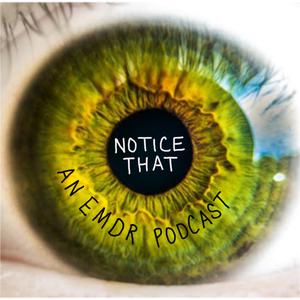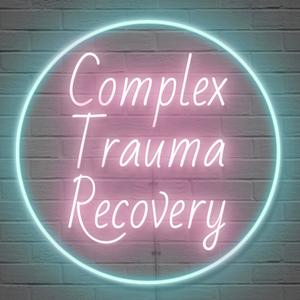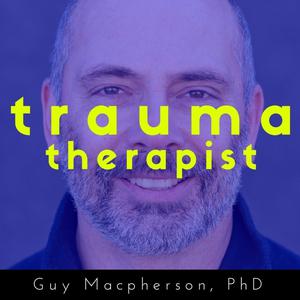
The EMDR Podcast
Thomas Zimmerman
Helping therapists work more effectively with complex trauma.
- 2 minutes 25 secondsWhen Complex Clients Insist on Doing EMDR Processing Immediately
When Complex Clients Insist on Doing EMDR Processing Immediately
Clients often urgently need to heal. Their lives are probably unmanageable and they may have significant relational, occupational, or functional stressors that need urgent attention. We can align with that urgency. However, urgency is not a substitute for preparation. If you have a complexly traumatized nervous system, your recovery is not going to be brief and the needed preparation probably isn’t going to be short. Your relief of the current stressors may not come in the short term, when those stressors are the direct result of your allostatic load.
EMDR therapy is different than our regular coping and survival strategies. It is not culturally intuitive. It asks you to sit in the states that you may have spent much of your life organizing against or put a needle in your arm to avoid. It requires a window of tolerance. EMDR therapy starts a fire in your nervous system and when that fire starts to get better, I encourage you to put more logs on it. You have to have the capacity to be set on fire, but not consumed by it. To do this work safely with complex trauma, EMDR typically requires careful preparation and execution. Client urgency replaces none of that need for preparation and care in execution.
I have told clients that they can fire me, but I’m not doing EMDR reprocessing with them if they clearly are not prepared to do the core things that EMDR therapy requires. That isn’t going to go well for them and the consequences of that would be on me. Because I knew better. I’m happy to do some parts work or some Flash with clients who are prepared to work in those ways, but I’m just not going to do EMDR therapy because of the client’s insistency and urgency when I can clearly see that is a horrible idea.
3 January 2025, 3:10 am - 6 minutes 52 secondsHow to Know When a Client is Prepared Enough to Start Processing Memories in EMDR Therapy?
Full text of this podcast is at the EMDR Podcast and EMDR365.com
1 January 2025, 4:10 am - 16 minutes 56 secondsEMDR Phase One: Are You Putting Your Complex Trauma Clients Through a Machine Built for Others?29 December 2024, 2:27 am
- 6 minutes 47 secondsWhy EMDR Therapy Does Not Seem to Quickly Shift Cognitions Broadly for Some Clients
EMDR Therapy shifts how you think about yourself and the world related to the memory we are working on. Why does it do this? Because that’s a lot of what healing is. Healing shifts how you think about yourself and the world, as well as lots of other things. Wounding is experiential learning and vast regions of our nervous system are organized around meaning-making in the foreground, midground, and background. Healing is also experiential learning. Broadly, in EMDR therapy and other transformational trauma therapies, it is not that difficult to help clients shift an individual memory and the cognitions associated with it.
Sometimes consultees will ask why a particular cognition that clients have worked on across multiple sessions isn’t showing up in how they broadly believe about themselves and how they actually live. The consultee may say, we have successfully worked on three different memories around the belief, “What I need doesn’t matter,” and they still don’t believe it broadly about themselves. How much wounding has this client had, where the take-home message was that cognition? Hundreds of experiences? Thousands? Tens of thousands of individual experiences that redundantly placed and reinforced that reality of the world? Saliently learned information in the service of survival isn’t meant to be shifted easily. That wouldn’t be evolutionarily wise. A parent who has the capacity to treat you as though your needs don’t matter will do that consistently. There are 154,000 hours in childhood and those hours may contain an enormous amount of salient, somatic, and deeply redundantly-placed learning.
It is entirely possible that you can work on a handful of memories with some clients with complex trauma and the broad belief about themselves may start to soften. That is remarkable. But for many, processing a handful of memories isn’t nearly enough disconfirmation to shift a whole cosmology. Three hours isn’t enough to offset the bedrock reality of 154,000 hours. But keep at it. And by that, I don’t mean endlessly hammering away at that individual cognition until it is fully resolved. In fact, to make good progress with it you may need the client to work in adjacent memory contexts and other categories of learning for a while. Return it. Check in on it. And the first clues probably aren’t going to be the client coming to session and telling you that they have arrived and the positive belief suddenly feeling true. You may see the emergence of a new belief in small things. You may hear the client reporting, almost offhand, that they set and defended a boundary with someone who has never respected theirs. When broad change happens with complex trauma, it often happens slowly, because the learning that we are trying to change isn’t small and limited, it is global and cosmological and has been reinforced across many developmental eras.
The fact that EMDR therapy can help shift such deeply held beliefs at all is a testament to how transformational trauma therapies can create learning experiences whose lessons can ripple through the client’s internal cosmos. The fact that sizeable chunks of this work can be done in dozens of hours and offset hundreds of thousands of hours of learning is remarkable.
...We need to be advocates when someone is trying to gaslight us about what complex trauma is and how easily people should be able to recover from it. We need to challenge when we hear EMDR being described as an ultra-brief approach to psychotherapy when most of this world’s wounding is of the complex type.
The world took its time with us when it set about wounding us. Healing is going to take its own time. We should understand and advocate that.
23 December 2024, 2:44 pm - 9 minutes 7 secondsWhy Some Clients Don't Want to Do EMDR Therapy after Successfully Doing Some EMDR Therapy20 December 2024, 4:26 am
- 12 minutes 22 secondsWhy I Rarely Start With Attachment Wound Targets
A summary of why attachment wound targets in EMDR therapy are a uniquely difficult place to start.
16 December 2024, 3:32 am - 27 minutes 12 secondsWhen "Letting Things Go Where they Go" Goes Straight Off a Cliff in EMDR Therapy
The full text of this episode is available on the EMDR Podcast here: https://emdrpodcast.com/2023/12/13/lettingthingsgo/ The script for the videotape approach mentioned in the podcast is here: https://emdrthirdweekend.com/posts/videotape-approach-script-with-complex-trauma-phases-three-and-four
13 December 2023, 1:50 am - 8 minutes 41 secondsAre You Trying to Put Your EMDR/Mindfulness Clients Through a Machine?
A child's toy metaphor for the need to adjust your interventions to the nervous system you are working with.
10 December 2023, 1:54 am - 3 minutes 51 secondsWhen a Low SUDs May Not Be Ecological
When a SUDS of One, Two, or Three May Not be Ecological
You are technically correct, quoting Dr. Shapiro in EMDR Therapy when you say that a SUDs of one can be ecological if it “sounds right.” Shapiro's example of an Uncle who died. Shapiro worked with really healthy people and what’s in a one with her clients may be different than what’s in a one or a two with clients with really complex trauma. With really healthy people, you can go to installation if the SUDs is a one if it “sounds right” and the debris will likely get cleared up in Phases Five and Six. You may be tempted to say that because I’m working with a complex client, a two is pretty good. Especially if we are starting at an eight to ten SUDs. And it is. Yes, we don’t want to make the perfect the enemy of the good. However, a lot can be hiding in that one or two with a client with complex trauma. If I had $5 every time the client said that the SUDs was a one, two, or three and it wasn’t going to go lower and it immediately went lower once they noticed it, I’d be able to go on a nice vacation. Out of the country. It’s simply good practice to identify what makes it that one, two, or three and ask the client to notice it a few rounds. And you know what happens, 97%+ of the time? It goes lower within a few sets of the client saying that it isn’t going to go lower. And yes, there are ways to do this respectfully what the client says to you, but also lets them fully and adaptively resolve that memory. Really good things happen when clients fully and adaptive resolve memories. Generalization occurs. Installation isn’t junky. Body scan isn’t leaving debris. A one or a two may also be an ember that may ignite other things between sessions. Don’t want to run the marathon and then sit in the lawn chair within sight of the finish line. If we can, finish it. Get your time. Get that race in the books. Whatever it is that makes it a one, two, or three, or whatever it is that makes the Validity of Cognition a five or six, notice that and it is highly to movie in a positive direction… unless it’s about something in the future or about other things from the past. That’s not your target. We’re in the business of resolving memories, not whole themes all at once and we don’t work in the past and the future at the same time. We have the future prong and future template for that. What is it that makes it a two? Notice that. If it doesn’t go lower, that’s okay. But it’s also okay to notice whatever that two is a few rounds before you assume that it’s good enough for this client on this day.
10 December 2023, 1:52 am - 6 minutes 53 secondsYou May Do the Least Reprocessing with the Clients Who Need it the Most
You May Do the Least Reprocessing with the Clients Who Need it the Most
29 November 2023, 7:29 pm - 13 minutes 43 secondsParts Work is Central to EMDR Therapy
Full text of this episode is at:
https://emdrpodcast.com/2023/11/29/parts-work-is-central-to-emdr-therapy/
29 November 2023, 7:18 pm - More Episodes? Get the App
Your feedback is valuable to us. Should you encounter any bugs, glitches, lack of functionality or other problems, please email us on [email protected] or join Moon.FM Telegram Group where you can talk directly to the dev team who are happy to answer any queries.
 Therapist Uncensored Podcast
Therapist Uncensored Podcast
 Attachment Theory in Action
Attachment Theory in Action
 Notice That
Notice That
 Complex Trauma Recovery
Complex Trauma Recovery
 The Trauma Therapist
The Trauma Therapist